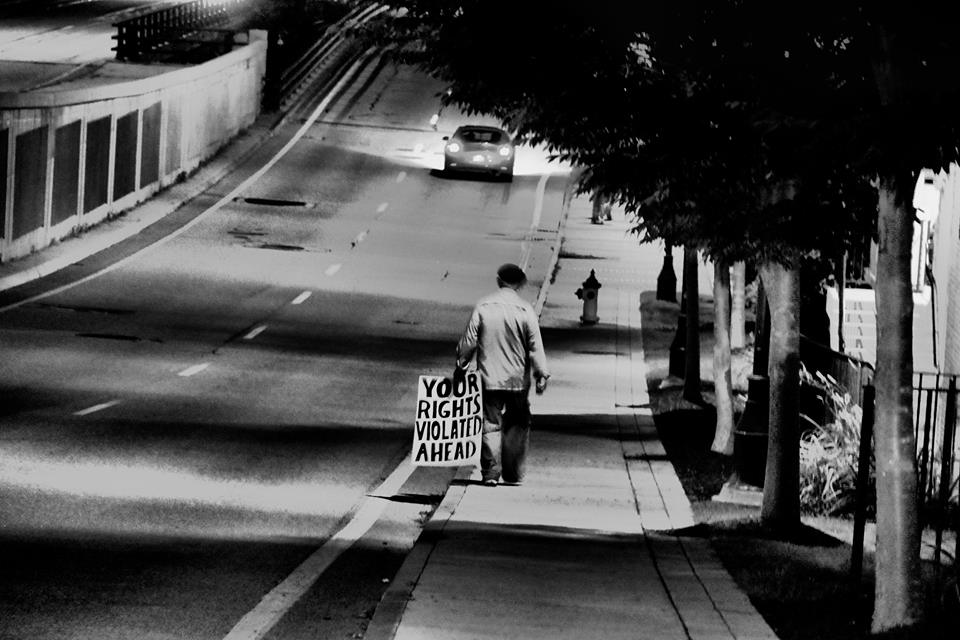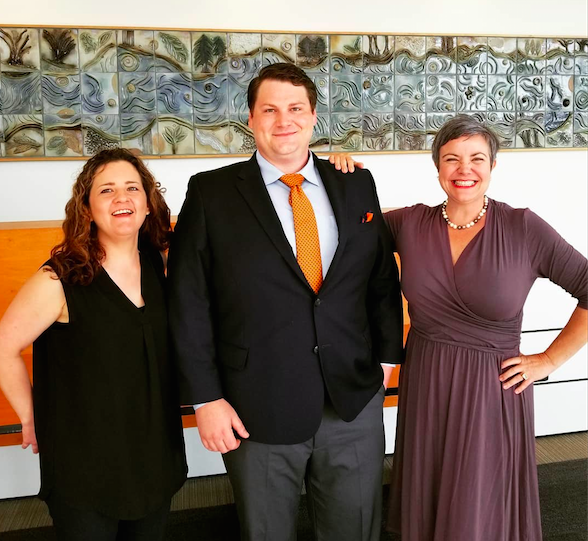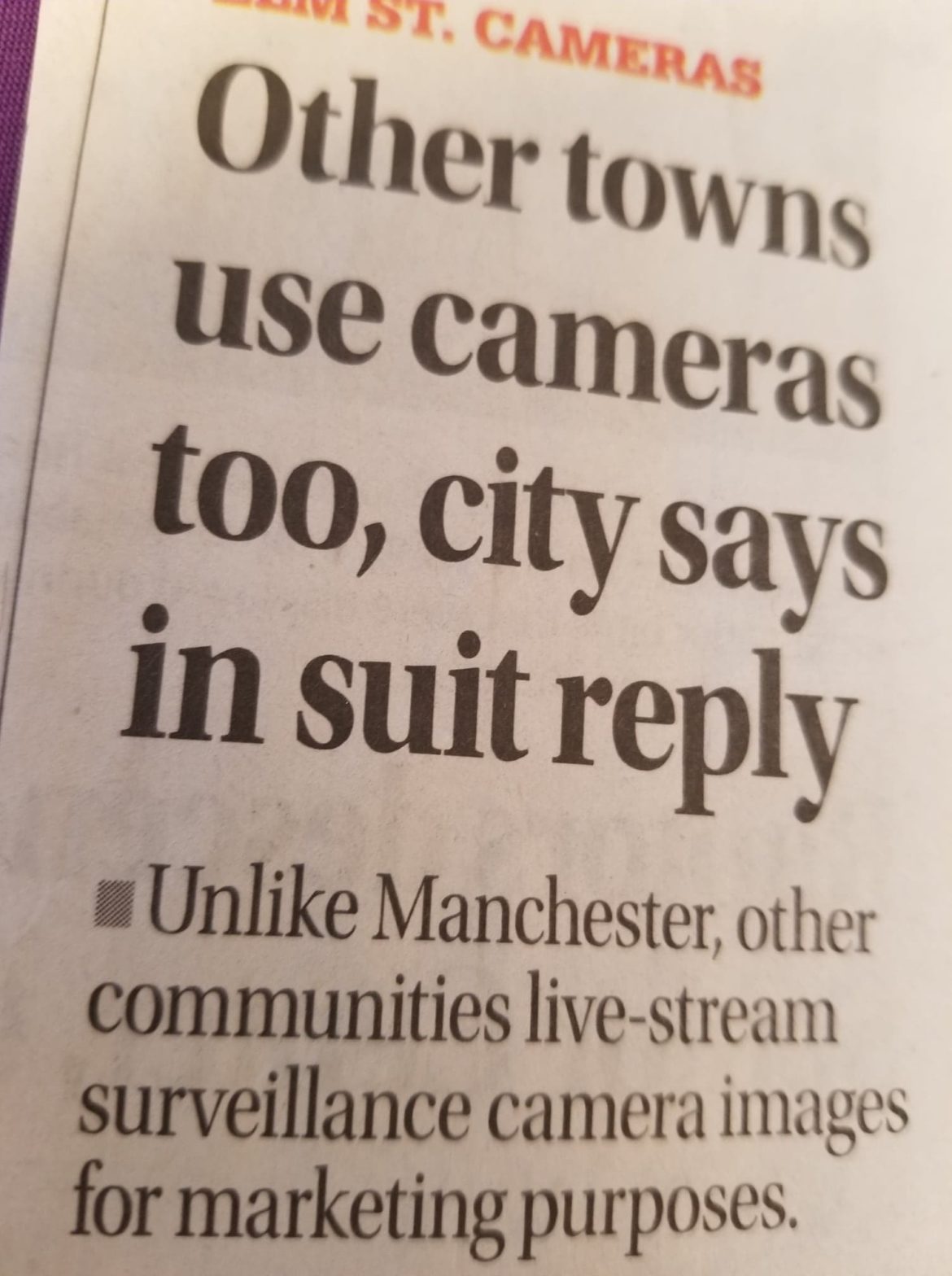This week, we fill you in on egregious violations of your Right-to-Know by discussing three current cases in front of the NH Supreme Court (read more here), how use of force compares between law enforcement on the streets of America and soldiers in combat zones (the rules of engagement in war zones are stricter! Wut!?!), the City’s police surveillance cameras are coming, and more!
surveillance cameras
Cameras will “Enable Government to Violate Statute,” So Let’s Authorize Them, Court Rules
As many of you know, the ACLU-NH has been fighting on my behalf to try to stop permanent police surveillance cameras from being installed in downtown Manchester. Yesterday, I received a court order denying our request for declaratory and injunctive relief, which in plain English means: the City won this round, the police will likely put up their cameras, our rights will continue to be eroded and disregarded with the full authorization of the Courts, and, apparently, we should just accept the stripping away of more and more of our 4th Amendment rights.
The Court said:
It could be argued that the City’s planned use will enable the government to violate the statute. However, simply because footage generated by the cameras could be used to violate the law does not mean the installation or use of the cameras itself violated the law…
The Court cannot find as a matter of law that the planned use of the surveillance cameras will violate RSA 236:130 [Highway Surveillance Prohibited]. Instead, the Court can only speculate that, once the cameras are installed, a government employee reviewing the footage will be capable of engaging in additional conduct that will violate the statute. Accordingly, plaintiff’s motion for summary judgement is denied.
Neal Kurk, et al vs. City of Manchester Docket No. 216-2019-CV-00501
By the Court’s logic, every single current pre-crime statute should be invalidated. You know, the ones where they say you MIGHT do something bad in the future, like crash your car if you’ve been drinking, so we will punish you right NOW, even though you didn’t actually do the thing we’re trying to prevent… Yet. (Or at all.)
The Court also failed to fully consider the legislative history, which you may recall, included this testimony from Dpt. of Safety Assistant Commissioner, Earl Sweeney in 2006, that the law would ban a police department from “setting up cameras to monitor, for example, the downtown business district to detect or deter burglaries, vandalism, drug dealing,” and, “Some police departments set up cameras to monitor downtown businesses… we do not believe that this usage would be allowed in NH without specific legislation at a future time legalizing it.”
Given this, it is safe to say we should no longer rely on the truthfulness of testimony given by government agents during the legislative process. Along the same vein, we should also not trust the MPD’s contention that they will not use facial recognition software or license plate scanners. I am willing to bet any comers they will secretly start using this technology in the future, and if the cameras go up, I encourage anyone who is in a vehicle and issued a citation or arrested in the vicinity of the cameras on Elm Street, to contact me.
While this case revolved around a narrow point of law relating to a specific statute, 82% of Granite Staters voted last year to increase our privacy rights, which tells me this matter isn’t over by a long shot.
Right of Privacy: An individual’s right to live free from governmental intrusion in private or personal information is natural, essential, and inherent.
Article 2-b, New Hampshire Constitution, December 5, 2018
I’ll conclude with the following: If you believe government can solve problems by restricting more and more of our rights and making us less free in the name of “security,” why do all stories set in the future revolve around people fighting their dystopian overlords? If the future is so bright in this Brave New World, where are the depictions of their promised land? Where is this awesome future society where, by “giving up liberty for security,” things turn out to be oh-so great for us plebs?
I’ve said it before and I will say it again: When you watch futuristic movies, who are you rooting for? In the Matrix, are you rooting for Neo or Agent Smith? In the Hunger Games, Team Katniss, or District 1 of the Capitol? Because, right now, if you aren’t on my side, you are rooting for tyranny, and it is NOT going to end well. Free people move freely. Free people certainly move freely without being surveilled by a group of people who claim to work for us while also keeping a secret list of their worst people from us.
Want to learn more? Read the backstory here, here, here, and here. Listen to my podcasts on this topic, Living with Lockdowns, Big Brother is Watching, and You Don’t Need to See This List of Bad Cops, Citizen.
I joined Jack Kenny for a heated discussion about the 24/7 Orwellian police surveillance cameras being proposed for downtown Manchester. I stick to my guns that the cameras are symptomatic of government overreach that will ultimately lead to a dystopian future, and Jack takes the “security over liberty” position, and even trots out the Nazi quote from Minister of Propaganda Goebbels himself: “If you have nothing to hide, you have nothing to fear.”
While we are on the subject, read Edward Snowden’s take on why privacy is such an important right. And consider this Computer Weekly article, “Debunking a myth: If you have nothing to hide, you have nothing to fear.”
Big Brother is looming over Manchester, and our hosts are pushing back with a lawsuit against proposed surveillance cameras on Elm St. From ancient Roman secret police to Bentham’s Panopticon and Orwell’s telescreens, surveillance has been a topic of controversy and discussion for as long as humans have existed in community with one another. What cultural and political changes would constant surveillance bring to New Hampshire? Dive into the dirty details on this week’s episode of Told You So! LISTEN NOW…
I’m working on a summary of yesterday’s proceedings regarding the City of Manchester’s proposed plans to put up several surveillance cameras downtown. In the mean time, here’s today’s coverage from local media sources…
We want more privacy,” plaintiff Carla Gericke said. “We want the government’s role to be limited and restricted as it’s constitutionally supposed to be. Let’s not turn into a big brother Orwellian surveillance state.”
Gericke, a liberty activist who has sought state and local office, said she would have no issue with a storeowner installing a camera and voluntarily sharing video with police. ‘Everyone’s working together. That’s a decentralized approach,’ she said. ‘What we’re talking about here is a very centralized approach where it’s centralized in one group of people’s hands. We don’t know really what’s going to happen to the data and I think it’s naive to just say we should trust them.’
Carla Gericke, president emeritus of the Free State Project and a Manchester activist who led a protest against the cameras last April outside City Hall. She is concerned about the cameras having a chilling effect on future protests. She questioned whether the cameras would record future protesters and if the police would use the information to make a database of trouble-makers and renegades.
Carla Gericke, past president of the Free State Project, joins me for an update from New Hampshire and to discuss some important local issues that affect many communities. She has been at the forefront of a campaign against surveillance cameras, as well as securing the release of a list of bad cops — a list that a major state official is trying to keep suppressed.
Sign the Right-to-Know Laurie’s List petition TODAY!
Follow the Told You So Podcast on Facebook to stay up to date on happenings in the Free State of New Hampshire.
Last week, we were ready, willing and able for arguments regarding the illegal police cameras being proposed downtown. Unfortunately, due to circumstances beyond our control, the matter has been postponed and another judge was assigned to the hearing, which will now take place on July 9th.
The Union Leader covered the delay here, mentioning the fact that the City of Manchester has argued that several other jurisdictions are already using cameras, so it must be A-OK. Following this logic, if a cop bust you for speeding, you can argue it’s OK because other people were speeding and breaking the law, too… right?
Police Department’s latest defense for its downtown surveillance cameras: At least five other communities do it. A wrinkle to their argument: Milford, Concord, Exeter, Salem and Claremont stream their video feeds on the internet for all to see — usually for promotional reasons. Manchester city officials named the five communities in a 10-page legal brief filed Monday in Hillsborough County Superior Court. The brief is a response to a lawsuit filed earlier this month by civil libertarians challenging plans for police surveillance cameras on Elm Street.






